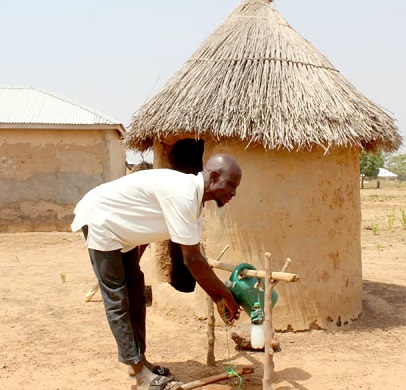A community is declared ODF when there is no visible faecal matter in the entire community for a period of two months or if, at least, 80 per cent of households can show they have latrines and hand washing facilities.
The community was assisted by UNICEF and the Yendi Municipal Assembly as part of the Community Led Total Sanitation (CLTS) programme, a behavioural change approach used to educate and help communities to eliminate open defecation globally, to achieve the feat.Under the programme, the residents were sensitised to how to observe basic sanitation practices as well as use basic materials to construct toilet facilities in their homes.
Though it was difficult for the community members to adapt to the approach, education on the health implications of open defecation enabled them to collectively embrace it.
Funded by Global Affairs Canada, the project also used local technology and artisans to provide tailor-made latrines for the residents.

Ibrahim Bawa, a resident of Gbungbaliga washing his hands after using the latrine in his house
Relief
"We used to defecate anywhere around us and we saw nothing wrong with the practice, although sometimes we got bitten by reptiles in the bush, especially in the night.
“I have a household of seven and we used to compete for space to defecate around the house, when it was raining as we found it difficult to attend to the call of nature", Mr Ibrahim Bawa, a resident of Gbungbaliga, said.
Like many residents of the community, Mr Bawa’s household used to practise open defecation due to the lack of latrines.
According to the United Nations (UN), 19 per cent of the country's population still engages in open defecation, a practice which is a major health risk, especially among children and other vulnerable groups.
This implies that in spite of the various interventions undertaken by development partners and the government over the years to ensure the attainment of an open defecation free (ODF) status by 2030, a significant number of the population are still engaged in the practice.
Behaviour change approach
For residents of Gbungbaliga, it was a long and tough journey of behaviour change because they were used to the practice.
But for now, they are proud to be declared ODF and a sanitised community which has restored their pride and dignity.
The Yendi Municipality, where Gbungbaliga is located, is making significant strides in fighting open defecation in the region.
In 2019, it was recognised for attaining 60 per cent ODF at the launch of the seventh ODF league table in Tamale. The municipality has 241 communities and out of these, the ODF communities are 145, while open defecation communities are 96.
The community has witnessed some health benefits as sanitation related diseases such as cholera and malaria have reduced significantly, the Assemblyman for Gbungbaliga Electoral Area, Mr Alidu Haruna, said.
Aside from the construction of the household latrines, he said the chiefs and people observe every Friday as a day to keep the environment clean, adding that anybody who failed to show up was sanctioned.
Visit
During a visit to the community by a team of ministers and metropolitan, municipal and district chief executives (MMDAs) to assess the sanitation situation, it was discovered that the entire community was tidy with toilet facilities in every house.
Led by the Deputy Minister of Sanitation and Water Resources, Mr Michael Yaw Gyato, the team was amazed at the commitment of the residents to the fight against the menace.
The Chief of Field Office at UNICEF, Ms Margaret Gwada, said it was important for individuals to take up their own sanitation seriously because its health implications were on the rise.
She said the CLTS project initiated by UNICEF to ensure ODF was yielding positive results because a number of the communities in the northern region had stopped the menace.
"We appreciate the efforts of the community because they are doing well in ensuring that they construct toilet facilities," she said, adding that UNICEF was determined to support the government's efforts to make the country open defecation free.
For his part, Mr Gyato commended the community for adopting the behavioural change approach to improve on sanitation in the area. He reiterated the government's commitment to adopt the approach as the surest means of achieving nationwide ODF by 2030.
 info@businessghana.com
info@businessghana.com
















